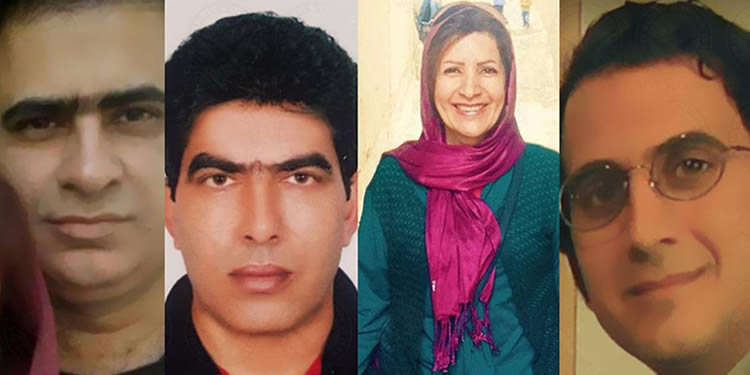Source: www.hra-news.org
Translation by Iran Press Watch
 HRANA ‒ Despite the passage of 10 days the following Baha’i citizens living in Shiraz are still being held in solitary confinement: Saeed Ettehad, Qassem Masoumi, Siamak Honarvar, Soroush Abadi, Sedigheh Aghdasi, Alieh Foroutan and Behrooz Farzandi Ardakani.
HRANA ‒ Despite the passage of 10 days the following Baha’i citizens living in Shiraz are still being held in solitary confinement: Saeed Ettehad, Qassem Masoumi, Siamak Honarvar, Soroush Abadi, Sedigheh Aghdasi, Alieh Foroutan and Behrooz Farzandi Ardakani.
These citizens were arrested on April 6th, 2021 after a search of their homes and confiscation of a number of personal belongings by Islamic Revolutionary Guard Corps (IRGC) intelligence agents, and were transferred to one of the detention centers under the supervision of this security agency.
According to HRANA, the news agency of Human Rights Activists in Iran, as of Friday, April 16th, 2021, after the passage of 10 days, seven Baha’i citizens living in Shiraz were still in detention and their fate undecided.
Although the families of some of these citizens were able to meet with them for a few minutes recently, they have not received any response from the security and judicial authorities regarding the charges, the reasons for their detention, or the current situation of these citizens. Saeed Ettehad, Qassem Masoumi, Siamak Honarvar, Soroush Abadi, Sedigheh Aghdasi, Alieh Foroutan and Behrouz Farzandi Ardakani are currently being held in solitary confinement in Shiraz Police Detention Center No. 201, under IRGC detention and interrogation.
These seven Baha’is, residents of Shiraz, were detained by security forces on April 6th. The homes of these citizens were also searched at the time of their arrest, and a number of their personal belongings, including cell phones, computers, as well as all books, works, and images related to the Baha’i Faith were confiscated. Simultaneously with the arrest of these Baha’i citizens, the homes of a number of other Baha’is, including Hayedeh Froutan, Keramat Nik Ain, and William Mumtazian, were invaded by security forces and a number of their personal belongings confiscated.
Among the detainees, Sedigheh Aghdasi was treated for joint and bone pain and hypertension until the day of her arrest. According to a source close to Ms. Aghdasi’s family, stress would exacerbate her illness, and this has added to her family’s concerns.
On the other hand, Behrouz Farzandi Ardakani, who is among the wounded former prisoners of the Iran-Iraq war, has been under medical care for more than 25 years due to heart disease and neurological and hearing problems caused by an explosion during the war. Authorities’ failure to respond to Mr. Ardakani’s condition, along with the outbreak of COVID-19 in prisons, has raised concerns about his health.
Mr. Farzandi was also barred from obtaining a degree in 2018 because of his religious beliefs due to the intervention of university security, on the pretext of losing his records. Earlier, while studying at the university, he was repeatedly summoned under various pretexts, being barred from study each time he was summoned to the university security. In 2017, Mr. Farzandi wrote a letter, the full text of which was published by HRANA, describing his problems and obstacles in the last semester of his studies at Payame Noor University in Shiraz.
Baha’i citizens in Iran are deprived of the freedom to practice their religious beliefs. This systematic deprivation of liberty occurs even though Article 18 of the Universal Declaration of Human Rights and Article 18 of the International Covenant on Civil and Political Rights entitle any individual to freedom of religion and belief as well as freedom to express it individually or collectively, in public or in private.
According to unofficial sources, there are more than 300,000 Baha’is in Iran, but Iran’s constitution only recognizes Islam, Christianity, Judaism, and Zoroastrianism; it does not recognize the Baha’i Faith. For this reason, the rights of Baha’is in Iran have been systematically violated in recent years.
Leave a Reply